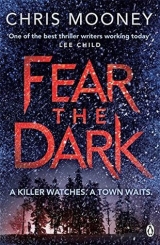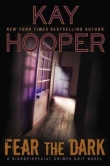
Текст книги "Fear the Dark"
Автор книги: Chris Mooney
Соавторы: Chris Mooney
сообщить о нарушении
Текущая страница: 5 (всего у книги 26 страниц)
14
Sally Kelly lived with six cats. An 8 × 10 photograph of each one was set in an expensive-looking matted frame, all of which were proudly displayed on her mantelpiece. Each photo had been taken on a Christmas-tree skirt, a small gold bell affixed either to a red or a green bow tied around the animal’s neck.
‘Lissie’s no longer with us,’ Kelly said, and pointed to a Maine Coon with a pancake-shaped head and a snaggletooth. ‘I had to put her down right after the holidays. She was hell on wheels that one, and about as friendly as a cactus. But she’ll always have a special place in my heart. Let’s go into the kitchen.’
If it weren’t for the pictures, Darby wouldn’t know that five cats, let alone one, lived here. The woman ran a fastidious household. The pleasantly warm air didn’t contain a single whiff of cat litter or urine, and the living-room carpet and furniture showed no sign of any fur.
The kitchenette was also immaculate. Darby sat at a breakfast nook with a wraparound high-back bench, the table covered with a blue vinyl cloth, while Sally Kelly, a petite woman with hair so shockingly white it seemed to glow, shuffled about the kitchen, making a fuss of making tea, even though Darby had declined the woman’s offer.
Maybe she just needs to keep busy, Darby thought, her ballpoint poised over her notebook. David Downes’s 53-year-old secretary was clearly still in shock from this morning’s grisly discovery. The woman’s face was leached of colour, her eyes bloodshot and puffy, and she kept looking around the black-and-green-speckled laminate counters and sand-coloured linoleum floor, blinking rapidly, as though she had misplaced or lost something of importance.
‘I explained what happened to the police,’ Kelly said, fetching mugs from a cabinet. ‘On the second day, when David didn’t report to work, I –’
‘Excuse me for interrupting, Mrs Kelly –’
‘Miss, actually. I’ve never been married. Please, call me Sally.’
‘I’m trying to get a feel for the family. What they were like.’
‘They were good and decent people.’
‘Mr Downes was a lawyer?’
Kelly nodded. ‘Real estate law,’ she said. ‘I worked for him … must be eight years now. He hired me as his secretary. Then he had to let his bookkeeper go, when the housing bubble here burst, and I took over those duties too.’
Kelly placed teabags into a pair of heavy white mugs that sat on the narrow laminate counter and set some water to boil in a saucepan on the stove. She had developed the same unresponsive glare Darby had seen over and over again in the family and friends of murder victims – a thousand-yard stare that begged for someone to release them from purgatory and to return them to a normal life.
‘They made –’ Her voice caught. Kelly swallowed and cleared her throat. ‘They made me identify the bodies.’
‘Mr and Mrs Downes didn’t have any family in the area?’
Kelly shook her head. She wore jeans and slippers and an oversized grey wool sweater that came down almost to her knees. ‘David was an only child,’ she said. ‘Linda too. They met in high school, here in Red Hill, did you know that?’
‘No, I didn’t. I’m sorry for your loss.’
The woman’s eyes were bright. ‘Such horrible things shouldn’t happen to good and decent people.’
Darby could hear the faint tick of a clock coming from somewhere down the hall. She waited a decent interval before gently moving forward.
‘What can you tell me about their daughter? What was Samantha like?’
‘Sammy was … solid. A solid person. Smart. Had her act together, never gave her parents a lick of grief – and what a hard worker! You don’t see that much any more. These younger generations, they don’t want to put in the time and effort. The sacrifice. They just want to click a computer mouse or tap some button on their phone and have everything given to them.’
‘Did you know her well?’
Kelly nodded. ‘He made me a part of his family, David,’ she said. ‘I had dinner with them just last week.’
‘When?’
‘Sunday. Linda made pot roast. She was a very good cook. Took it up after she retired. She was a nursery-school teacher.’
‘Was Samantha there? At dinner?’
Kelly nodded as the kettle whistled.
‘How did she seem to you?’
‘The way she always did, sunny and happy.’ Kelly poured the boiling water into the mugs. ‘Well, maybe a little the worse for wear. She was putting herself through graduate school. University of Denver. Business, I think. Or economics, one of those.’
‘Do you know where she worked?’
‘Wagon Wheel Saloon. It’s a bar. Downtown.’ Kelly picked up the mugs and carried them to the table, walking stiffly. Painfully. She caught the question in Darby’s eyes.
‘Fibromyalgia,’ Kelly said. ‘It’s always worse in the winter, especially when the temperature keeps jumping up and down.’ She placed the mugs on the table and then eased herself into the opposite seat. ‘One day it’s freezing cold, and then the next day it’s in the sixties, and all it makes me want to do is lie in bed.’
‘Did Mr Downes ever mention anything to you about his daughter having an encounter with a strange man? Maybe someone who was watching or following her?’
‘The police asked me those same questions. I told them no. If something like that had happened to Sammy, David never mentioned it to me. Well, there was – never mind, it’s stupid.’
‘Tell me.’
‘She said he smelled. Like garbage.’
15
Darby had her pen poised over her notebook. ‘Who smelled like garbage?’
‘This man at Sammy’s college,’ Kelly replied.
‘This man was a student?’
‘I think so. I don’t know for sure. I overheard Sammy talking to her father about it, when she came to the office to get his keys.’
‘When did you overhear this conversation?’
Kelly’s face reddened with embarrassment. ‘I wasn’t eavesdropping, if that’s what you’re insinuating,’ she said. ‘The door was open and they were chitchatting about college, how classes were going – that sort of thing.’
‘When was this?’
‘In … September, I think. Yes, early September. College had just started, and Sammy had come by the office to get her father’s car keys, because the car she used, Linda’s Buick, was having problems again. David told her to take his car to Denver because he was worried about her getting stuck on the road. Sammy said something along the lines of, “Remember that guy who came to class and made the room smell like a garbage truck? He never came back.” Something like that.’
‘Did she mention a name by any chance?’
Kelly shook her head. ‘The way she said it, though … She sounded sad. Like she felt bad for him.’
‘Did Samantha or Mr Downes ever mention this man again?’
‘No.’ Kelly casually waved a hand near her face, as if trying to swat away a fly, and added, ‘It’s probably nothing. Frankly, I feel foolish for even mentioning it.’
‘Don’t.’ Darby placed her hand on the woman’s bony wrist and smiled. ‘What can you tell me about Samantha’s friends?’
‘I know she was close to a couple of girlfriends from high school. Jennifer and the other one there … Debbie, I think her name was.’
‘Last names?’
‘I don’t know. I do know they’re no longer here. They moved away after college. Somewhere on the East Coast, I think. Most of Sammy’s friends moved away, there was certainly no reason for them to stay here. She was very close to her parents. Only children are sometimes like that. I wouldn’t know personally – the good Lord didn’t bless me with children – but I’ve read articles about how only children have attachment issues. As adults, they like to stick close to their families. Or so these so-called experts say.’
‘Did she have a boyfriend? Anyone serious?’
‘Not that I know of. She dated, obviously – she was a beautiful girl – but I didn’t know any of her beaus – and I most certainly did not ask.’
The way Sally Kelly spoke and acted for some reason reminded Darby of another era: the time of Prohibition and speakeasies, when women wore skirts that covered their knees. A time when men wore fedoras and nice suits and courted women and had the manners of proper gentlemen – opening car and restaurant doors, goodnight pecks on the cheek, calling everyone ‘miss’.
Darby closed her notebook and placed her business card on the table. ‘If you remember or think of anything else, you can call me on my cell. You can also leave a message for me at the station or at the hotel, the Silver Moon Inn. Thank you for your time, Miss Kelly.’
Sally Kelly gripped the back of the bench and struggled to rise.
‘I can let myself out,’ Darby said. ‘Please, sit.’
‘I need to lock up after you leave.’
Darby helped the woman to her feet. ‘What’s your take on the Red Hill Ripper?’
‘My take?’
‘You have any thoughts on it?’
Kelly looked like she’d been asked to lick a toilet seat. ‘Absolutely not,’ she said, as they shuffled into the living-room. ‘That is not a topic I choose to dwell on.’
‘Why’s that?’
‘Are you married? Live with anyone?’
Darby shook her head.
‘I’ve been on my own my whole life. You reach a certain age and you learn to shut out certain things or you’ll spend the remainder of your life in a constant state of paralysing fear.’ There was no anger or remorse in her voice or expression, just a sad acceptance. ‘I purposefully don’t follow the news any more because I find it too upsetting, too violent. I’m not naive, but that doesn’t mean I have to invite it into my life. And I certainly don’t want to carry such thoughts with me into bed each night.’
They had reached the front door. There was no peephole or deadbolt, just a cheap rickety security-door chain that had probably come with the house. It looked old, and the brass plating had chipped away over time.
‘It’s an exercise in futility, isn’t it?’
‘What is?’
‘Evil. Trying to understand it, trying to stop it. It will have its way with you if it wants, won’t it?’
Sally Kelly seemed to be waiting for an answer. Darby didn’t have one to give her.
16
The Silver Moon Inn resembled one of those old-time prosperous banks built during the height of the mining boom – three floors of weathered brick and Victorian-style windows, each with a fleur-de-lis above the keystone. Parking was in the back.
Darby stepped inside the dimly lit lobby and felt as though she had just slipped through a portal into an early-nineteenth-century gentlemen’s club, the kind where old white men wore three-piece suits and carried pocket watches and sat around discussing politics and the matters of the day while smoking cigars and drinking single-malt Scotch served to them by white-gloved waiters. The ornate chandelier hanging over the well-worn leather club chairs looked like it had been rescued from some dank English castle. The small reception desk was made of old wood. Mounted on the wall behind it was an old-fashioned cabinet of pigeonholes, used to store the individual room keys. A banker’s lamp glowed from the corner of the front counter.
Darby placed her box of files on the counter. Apparently the owner wanted to keep the whole Boardwalk Empire motif going, because she didn’t find a computer, just a thick ledger, and, lying on its top, an antique-looking fountain pen and a small, pear-shaped bottle of black ink with a tuxedoed penguin on the front. The blue and red sticker for ‘J. D. Humphrey Ink’ had cracked and yellowed over time, and its edges had curled.
Darby found the hotel bell, but there was no need to press it; the door behind the reception counter had swung open. The woman who lumbered out had a braided grey ponytail and wore lots of silver jewellery. She looked exhausted, the bruised skin under her eyes hanging like black curtains. Darby assumed she slept in the back office: she had spotted a cot propped up against the wall before the door shut.
‘Welcome to the Silver Moon Inn, Miss McCormick.’ The woman saw the question mark in Darby’s face and said, ‘The FBI told me you’d be coming in sometime today. You’re on the ground floor, Room 8.’ She reached into a pigeonhole and came back with a key.
‘An actual, physical key,’ Darby said with a grin. ‘I can’t remember the last time I was at a hotel that used one of those.’
‘The owner is real intent on maintaining the hotel’s Old World charm.’ The woman stepped aside and, turning, pointed to a rotary phone mounted on the wall behind her. ‘That’s the hotel’s original phone.’
‘Does that thing still work?’
‘Absolutely. There’s a company in Iowa that adapts all the old phones so they’ll work with the new technology.’ Then with a sly grin, she added, ‘But don’t worry, everything in the room is completely modern. My name’s Laurie Richards. Please don’t hesitate to contact me if you need anything, Miss McCormick.’
Darby entered her hotel room, tired and sore, and wanting two things – a long shower followed by a stiff drink.
The stiff drink wasn’t an option, at least at the moment. The room didn’t have a mini-bar, but there was a bar across the street, a place with a big wagon wheel in the front. As far she could tell, it was the only thing open in downtown Red Hill besides the Silver Moon Inn.
The country’s never-ending economic recession seemed to have hit Red Hill especially hard. Taped to the inside glass windows of virtually every business she’d passed on the way here were signs and handwritten messages on poster boards that read OUT OF BUSINESS or CLOSED PERMANENTLY. She hadn’t seen a single Starbucks or Dunkin’ Donuts; there were no chain restaurants or big box supermarkets, hardware or department stores. Either gentrification had somehow bypassed Red Hill or big business wasn’t interested in creating anything here, viewing the town as the equivalent of a toxic-waste dump, a place where nothing would thrive.
Darby placed the cardboard box of evidence files on her bed. Then she went back into the hall to retrieve her suitcase, forensics kit and briefcase, and used her foot to shut the door.
Her room had crimson-painted walls and a headboard and bedframe crafted from birch logs. It had recently been cleaned; she could smell lemon-scented furniture polish, and the vacuum cleaner had left tread marks in the soft carpet. The pair of windows on the far wall overlooked what appeared to be a dense section of woods, but it was too dark out there to see.
Darby hung her jacket inside the small closet and slipped out of her boots. She opened up the box, picked up a random file and opened it – the Connelly family, who had been murdered last month. She flipped through the thick stack of pages, pleased to find that the Denver state lab hadn’t skimped on crime scene photos.
Her encounter with Deputy Sheriff Lancaster hung in her mind like an uninvited houseguest. The only way to get him to leave before he took up permanent residence was to focus her attention on something else – something productive. She sat cross-legged on the bed and removed the remaining evidence files.
The first murders had occurred just over a year ago, on 4 January. Eighteen-year-old Cynthia Gardner, home for the Christmas holidays, had stayed the night at a friend’s apartment in Denver. When she went to her parents’ house the next morning she found them seated across from each other in kitchen chairs placed at the foot of their bed. Her mother had been strangled, the T-shirt that she slept in ripped open to expose her breasts. A black garbage bag had been tied around her father’s head. The Red Hill Ripper had waited until spring to kill the Bowden family. The Brazilian woman they employed to clean their house every two weeks had used the key given to her to enter. When she stepped over the threshold, an odour like spoiled meat and sewage hit her like a fist. After she vomited in the bushes, she used her cell to call the police. Martin and Heather Bowden had been killed the same way as the Gardner family.
Talk of a possible serial killer had spread through the small town. Jim and Elaine Lima had installed new locks on their doors to protect them and their twin sons, Brad and Alex, who were in their senior year at Brewster High. Brad hadn’t been home that night; he had been away on a ski trip when the Red Hill Ripper killed his brother and parents the week before Thanksgiving.
Three weeks later, John and Lisa Connelly and their sixteen-year-old daughter, Stacey, were found dead by John’s sister, who had arrived from San Diego to spend Christmas and the New Year with her brother’s family.
No semen was found at any of the crime scenes or on the bodies. The medical examiner found no evidence of penetration. The breasts of the female victims showed extensive bruising, the result of having been pinched and twisted.
Darby spent most of her time on the bedroom pictures. With the exception of the victims, the crime scenes were nearly identical: same plastic bindings and duct tape; same seating arrangement; and the same black garbage bag tied around the father’s or husband’s head. The killer had entered the home by cutting a hole through a window or sliding glass door.
Darby arranged the bedroom photographs on the quilt and stared down at them, willing a thought to come to her. She paced around the room, thinking. She could see only carnage and desperation.
Darby pinched the bridge of her nose and blinked her eyes several times, trying to get some moisture into them. Then she arched her back and stretched. She was thinking about heading into the shower when she recalled the bar across the street, the one with the big wagon wheel out front. Samantha Downes had worked at a bar called the Wagon Wheel Saloon.
The shower could wait. Darby picked up her jacket and headed back out.
17
The Wagon Wheel Saloon was one of those local tourist traps designed to give people an authentic old-time cowboy experience: duckboards covered with green sawdust; oak timber beams and wood walls festooned with antique six-shooters; and black and white pictures of cowboys, miners and settlers; wood-bladed ceiling fans; and a long, handcrafted mahogany bar with brass poles, its top polished to a high shine.
The dining area, which made up the entire left side of the room, consisted of a dozen or so tables covered with red and white checked tablecloths. About half were occupied, either by elderly couples eating in silence or by haggard-looking couples who were unwinding after work or enjoying some peace and quiet away from their kids. They all looked like what she called the ‘God Bless America Crowd’ – people who, she suspected, listened to country music and went to church every Sunday, organized bingo fundraisers and did potluck get-togethers with other couples. An archway in the corner led to a room with a pool table, and, on the other side of it, a jukebox swirling with neon colours.
Darby approached the lone man standing behind the bar, at the far end, loading draught beers on to a waitress’s circular carrying tray. He had a bowling-ball-shaped head and greying brown hair thick with some sort of styling product designed to give him that I-just-got-out-of-bed look.
She leaned against the bar, waiting for him to finish, and out of the corner of her eye she saw a group of men seated at a nearby table stop their conversation and take turns checking her out. They didn’t go about it surreptitiously, either. All five of them turned and gawked. Three continued to stare brazenly, one pretended to be busy with his phone, while another raised his beer in salute and winked at her. He had cold blue eyes and a promising future as a wife beater.
Had the Ripper sat at one of these tables, watching Samantha Downes delivering drinks and food? Had she ever waited on him? Had they talked? Or had he, like the majority of sexual predators, watched her covertly, circling her like a shark and collecting information?
The bartender stepped up to her. He wore a black polo shirt, the sleeves stretched around biceps the size of grapefruits, and he had a blue and red tattoo of a snake along his right forearm.
‘If you’re here to eat, you can go on and grab a seat.’
‘The owner around?’ Darby asked.
‘Why, you looking to buy?’
Darby showed him her federal ID.
The man sighed heavily. ‘I was wondering when you guys were going to show up,’ he said.
‘Why’s that?’
‘You’re here to talk to me about what happened to Sammy Downes, right?’
‘You already heard what happened?’
‘Yeah,’ he said sadly.
‘From who?’
‘Everyone’s talking about it. And it’s posted on the Item’s website. That’s our local newspaper, the Red Hill Evening Item.’
Then she remembered: a young-looking photographer had snapped pictures of the black body bags being removed from the house while a reporter from the Red Hill Evening Item, a chubby man with a full beard and a tweed jacket, got a brief statement from Ray Williams. They had been the only two onlookers who had showed up at the house.
‘I am the owner, by the way. J. D. James Doherty.’
She shook his hand. ‘Darby McCormick. How well did you know Samantha Downes?’
He shrugged. ‘As well as an employer can know his employee, I guess. She worked for me for … five months? She was …’ His thoughts drifted for a moment. Then he leaned forward and gripped the edge of the bar. ‘Sammy was the kind of kid you’re always rooting for, you know? Smart, worked hard, had her shit together. Good kid, quiet, kinda kept to herself.’
‘And pretty.’
‘That too.’ He sighed heavily and then was quiet for a moment, locked on a private thought. ‘Goddamn waste.’
‘Any guys ever bother her?’
‘There were guys who hit on her – guys her own age. If someone was bothering her, she never mentioned it to me.’
‘What about an older guy, forties or fifties, who came in here alone and asked to be seated at one of her tables, maybe asked questions about her? Someone who might’ve given you or one of your employees or customers a bad vibe?’
J. D. was shaking his head the entire time. ‘I’ve been racking my brain about that all day,’ he said. ‘Is it possible someone like that was in here? Sure. But if he was, I didn’t see him. Believe it or not, this place gets hopping, and when it does I’m balls-to-the-wall. You should ask Evelyn. She’s one of my waitresses. Evelyn Roy.’
He pointed to a short woman dressed in tight black jeans and a black polo-style shirt who was in the process of transferring red baskets of onion rings and barbeque chicken wings with cups of blue-cheese dipping sauce from her carrying tray to a table where two middle-aged women were seated. Both women had round faces and wore oversized sweaters to hide their ample curves.
‘Evelyn can give you a better idea about Sammy,’ he said. ‘I didn’t know her beyond the employer–employee relationship. She was a great worker, showed up on time, never gave me any guff.’
‘What about the Red Hill Ripper? What’s the scuttle-butt around town?’
‘The scuttle-what?’
‘The gossip. Your employees and regular patrons, friends, people you talk to, what are they saying?’
‘I hear some people are trying to take out home equity loans to get burglar alarms installed. God knows I’ve changed my locks. I’ve got two kids. My wife makes me sleep with a baseball bat next to the bed.’
‘What about you? What do you think’s going on here?’
He shrugged. ‘Who knows? I haven’t given it much thought. The main thing on my mind is how to keep my head above water, financially. I know that sounds cold, but, well, I’m being honest. Something to drink?’
Darby ordered a Maker’s Mark. When he returned with the glass, she gave him her business card, along with a twenty, and told him to keep the change.
The waitress, Evelyn Roy, was twenty-two and wore a lot of foundation to try to hide her blemished skin. She had a degree in English and, like Samantha Downes, was having trouble landing what she called ‘a real job’. The young woman couldn’t recall seeing any older men who had given Samantha trouble or had come in there alone and watched her.
Evelyn said she didn’t know Sammy that well. ‘She was kind of … not shy but private,’ she said. She had a high-pitched nasal voice and a small chip along the bottom of a front tooth. ‘I kinda got the feeling she was under a lot of pressure.’
‘About what?’
‘Money? A boyfriend? Who knows?’ The young woman shrugged. ‘Like I said, she was private.’
Darby gave the woman her card and then took her glass to a bar stool near the front windows. She sipped her drink, trying to sort out her thoughts about the day; but they were scattered, like pieces of a ceramic jar that had been dropped from a great height. She couldn’t find enough shards and fragments to form a coherent thought.
She watched an older couple sitting at a nearby table. They were huddled together, sharing an iPhone and looking at the screen where a toddler was holding up what looked like a crayon drawing. At first Darby thought the couple were looking at a picture; then she realized they were talking via Skype or FaceTime.
Seeing the toddler made Darby think about David Downes again, that moment when he realized that he was going to die listening to his daughter begging for her life. Darby finished the rest of her drink and then went back to the hotel to make a careful study of the case files.








